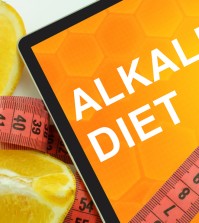- Make It Yourself Lavender Heart-Shaped Bath Bombs!
- 20 Things You Never Knew About “Down There”
- 12 Best Foods For Those Suffering From Arthritis Pain
- 12 Personal Hygiene Mistakes Almost Everyone Makes (Mom Never Told You About #4!)
- 15 Medicinal Plants And Herbs From The Cherokee People
- 12 Mind-Blowing Benefits Of Drinking Coconut Water During Pregnancy
- 12 Outstanding Winter Foods That Won’t Fatten You Up Like A Christmas Turkey
Can Omega-3s Fight Depression And Build A Stronger Brain?

Photo credit: bigstock.com
You’ve probably heard the expression “fish is brain food,” but what does that mean?
Fish, like certain other foods we’ll be discussing in this article, is often rich in omega-3 fatty acids. Among other things, omega-3s play a role in improving brain health and overall cognitive function. Unfortunately, people in industrialized countries are often deficient in omega-3 fats relative to other types of fat. This is, in part, due to the demonization of all forms of fat in the media for the past 50 years. The public is beginning to wake up to the benefits these amazing compounds have for improving overall health, and helping those with neurological conditions like depression. Let’s explore the role of omega-3s in more detail now…
The Lowdown on Omega-3s
There are different types of fatty acids which are found in food. Among these are the three different types of omega fats, omega-3, omega-6 and omega-9, which are classified as polyunsaturated, which means that they will remain liquid at both room and freezing temperatures. Omega fats are considered healthy, but they must be consumed in the proper ratios or certain health problems become more likely. The average American diet, for example, has a highly imbalanced of omega-6s to omega 3s, ranging from 10:1 to 25:1. Researchers have suggested our hunter-gatherer ancestors ate a diet that was much more balanced, with an approximate 1:1 ratio.
At the turn of the 20th century, the use of vegetable oils like canola and safflower oil began to increase dramatically, and the cattle industry began using more grain-based feed. These changes led to the drastic increase in omega-6 consumption, and along with it, a rise in heart disease, cancer and inflammatory conditions.
Omega-3s are an essential fatty acid and cannot be synthesized by the body. The only way to get them is through the diet. The solution to the modern omega fats dilemma is to make sure you are eating the right things (more on that later).
The most important varieties of omega 3s are as follows:
- ALA (alpha linolenic-acid), found mainly in plants
- EPA (eicosapentaenoic acid)
- DHA (docosahexaenoic acid)
These last 2 forms of omega-3 fats are found primarily in animal protein sources like fish.
Continue to Page 2

Photo credit: bigstock.com
Omega-3s in Fish Can Improve Cognitive Performance
The Spanish Childhood and Environment project conducted a study on 2,000 pregnant women and their children to determine whether or not a diet high in fatty, omega-3-rich fish affected the cognitive performance of their children after birth.
The study began during the first trimester of pregnancy, and monitored the quantity of fish the women consumed during pregnancy. Follow-up exams were given to children who were born to those mothers. The study on children used the Child Asperger’s Syndrome Test.
The study found that those mothers ate more than 340 grams of fish per week produced children who scored higher on cognitive tests and had fewer traits listed on the autism spectrum. The children of mothers who ate the most fish seemed to benefit more: the study linked the mothers who ate 600 grams of fish per week to a 2.8-point increase in IQ over the children of those who ate less. It also appeared that eating plenty of fish early in the pregnancy, beginning in the first trimester, produced the strongest results.
This is important news, given that women in developing countries are often discouraged from eating large quantities of fish during pregnancy due to concerns over mercury contamination. Interestingly, the researchers did detect higher levels of mercury in the babies’ umbilical cords, but not find a negative correlation between this and the child’s future cognitive performance.
Past research on ocean fishes (which comprised much of the fish consumed by the mothers in this study) indicates that a lot of seafood contains high levels of selenium, which plays a role in reducing mercury accumulation in the body.
More research on this needs to be done, so pregnant women shouldn’t start piling on the ahi tuna steaks just yet, but this does offer some promising results for expecting mothers who enjoy fish and don’t want to negatively affect their baby’s development.
Continue to Page 3

Photo credit: bigstock.com
Omega-3s and Depression
Researchers at the University of Amsterdam performed a review of 13 different studies detailing the effect omega-3 supplementation had on people with major depressive disorder.
Their findings indicated that patients taking omega-3 supplements appeared to get better results from their antidepressant medication(s) than those who did not.
Another recent study published in the Journal of Clinical Psychiatry more firmly established a link between depression patients with higher blood levels of omega-3 fatty acids and improved symptoms. Interestingly, the patients who benefited the most from supplementation were the ones who already had the highest levels of omega-3s in their body at the beginning of the study.
More research needs to be done to definitively establish a link, but past studies appear to clearly indicate a link between higher consumption of omega-3 fatty acids, particularly EPA, and improved recovery from depression.
A diet with plenty of omega-3-rich foods, particularly fatty fish, can improve cognitive performance and help maintain brain health. Omega-3s also appear to help reduce the symptoms in people diagnosed with depression.
READ ALSO: Could This One Thing be the Cause of Your Depression?
Add more foods containing omega-3s to your diet, and consider supplementing with a high quality fish or krill oil to reap the benefits of this essential nutrient.
References:
































